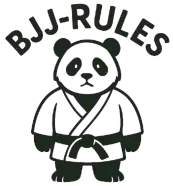Think you can take the quiz directly without reading this first article? Then it’s this way!
If you don’t have 10/10 (6/6 in fact!), we’ll see you in a few minutes!
In this blog post, we will discuss the various ways in which Brazilian Jiu-Jitsu matches are judged (2).
Match’s outcome shall be issued in the following forms (2.1):
A match’s outcome is usually determined based on one of the following factors:
- Submission, when one competitor forces their opponent to surrender.
- The referee’s intervention, which ends the match for safety reasons or to protect the physical integrity of the participants.
- The disqualification of a competitor due to non-compliance with the rules or unsportsmanlike behavior.
- The loss of consciousness of one of the competitors following a hold or immobilization.
- The score, which allows competitors to be ranked based on the points accumulated during the match.
- The referee’s decision, when they must decide in cases of a tie or when there are no clear criteria to determine the winner.
- The drawing of lots, used as a last resort to decide the winner in exceptional situations where no other method allows the competitors to be ranked.
These judgment criteria are essential for evaluating competitors’ performances and ensuring fair matches in Brazilian Jiu-Jitsu.
Submission (2.2) :
Submission occurs in the following situations:
- When a competitor clearly taps twice with their hand on their opponent, the ground, or themselves, signaling their surrender.
- If a competitor’s arms are immobilized by their opponent, they can also tap twice with their foot to indicate submission.
- An athlete can end the match by verbally expressing their withdrawal, thus requesting a halt to the fight.
- If a competitor is in a submission position and yells or makes noises indicating pain, this can also be considered a submission.
It’s a respectful and safe way to acknowledge an opponent’s superiority and end the match without risking serious injuries.
Match Stoppage (2.3) :
A match stoppage occurs in the following situations:
- If one of the competitors experiences a muscle cramp, their opponent is declared the winner.
- The referee can stop the match if they believe a hold could expose the athlete to serious injuries.
- If a doctor determines that an athlete is unable to continue a match due to an injury caused by their opponent’s legal hold, the match is stopped.
- A match can also be stopped if an athlete continues to bleed after two interventions from the medical staff. Each competitor is entitled to one medical intervention for each injury at the referee’s request.
- Lastly, if a competitor vomits or loses control of their basic body functions, such as incontinence, the match is stopped.
These situations aim to protect athletes’ health and safety while ensuring fair and rule-abiding matches in Brazilian Jiu-Jitsu.
Disqualification (2.4) :
Disqualification occurs when one or both competitors commit fouls outlined in Article 6. The referee must apply penalties according to Article 7.
Disqualification serves to maintain the integrity of the sport by penalizing rule-breaking or unsportsmanlike behaviors in Brazilian Jiu-Jitsu.
Loss of consciousness (2.5) :
A competitor is declared defeated due to loss of consciousness if this occurs during a legal hold by their opponent or due to an accident not caused by the opponent’s illegal maneuver.
It is important to note that if an athlete loses consciousness due to a head trauma, they cannot continue the competition and must be attended to by the medical team to ensure their safety and well-being.
Scoring (2.6) :
The winner is the athlete with the most points at the end of the regulation time or when the match is stopped due to injuries of both competitors. Points are awarded by the referee based on the following positions and successful actions:
- 4 points: mount, back mount, back control.
- 3 points: guard pass.
- 2 points: takedown, sweep, knee on the stomach.
In case of a tie in points, the athlete with the most advantages will be declared the winner. If both points and advantages are tied, the competitor with the least penalties will win the match.
The point and penalty system encourages athletes to adopt a technical and offensive fighting style while respecting the rules of Brazilian Jiu-Jitsu.
Referee Decisions (2.7) :
Referee’s decision comes into play when, at the end of the match, both competitors have the same number of points, advantages, and penalties. In this case, it is the referee’s responsibility (or the duty of the referees if there are three supervising the match) to declare the winner.
To determine the winner, the referee will assess which athlete was more offensive during the match and came closest to achieving a point-scoring position or a submission position.
This method helps to decide the winner in closely contested matches, taking into account the athletes’ overall performance and offensive spirit throughout the fight.
Random Pick (2.8) :
Drawing of lots is an exceptional method used to decide the winner in specific situations. In cases where both athletes are accidentally injured during a semi-final or final match and the score is tied at the time of the accident, with neither athlete able to continue, the result will be determined by drawing lots.
This method is used as a last resort when circumstances prevent a more conventional way of deciding the winner, ensuring a fair and impartial outcome.
You can find all these rules in the official ibjjf rules on the ibjjf website!
If you want to play the quiz corresponding to this article, click here !

